UK College: Entrepreneurship and Small Business Management Report
VerifiedAdded on 2021/02/19
|18
|5385
|34
Report
AI Summary
This report provides a comprehensive overview of entrepreneurship and small business management, covering various aspects such as different types of entrepreneurial ventures, their typology, and the similarities and differences between them. The report delves into the impact of micro and small businesses on the UK economy, highlighting their contribution to job creation and market share. It also examines the characteristics and skills of successful entrepreneurs, contrasting them with those of managers, and explores entrepreneurial personality traits, encouragement, and mindset. The report analyzes the influence of SMEs, including their positive effects like involvement of disadvantaged groups and job creation, as well as their negative effects, such as the high death rate of enterprises. Furthermore, the report examines the different activities linked to entrepreneurship, such as market prediction, product, and business planning. Overall, the report provides a detailed analysis of the key aspects of entrepreneurship and small business management within the context of the UK economy.

Entrepreneurship and Small
Business Management
Business Management
Paraphrase This Document
Need a fresh take? Get an instant paraphrase of this document with our AI Paraphraser

INTRODUCTION ...........................................................................................................................................3
TASK 1..........................................................................................................................................................3
P1 Different types of entrepreurial ventures and its typology ................................................................3
P2 Similarities and differences between various entrepreurial venture .................................................5
TASK 2..........................................................................................................................................................6
P3 Influence of micro and small business on the economy ....................................................................6
TASK 3........................................................................................................................................................10
P5 Characteristics and skill of successful entrepreur and explain how they are different from managers
...............................................................................................................................................................10
P6 Examine entrepreurial personality reflect over their encouragement and mindset. ......................12
TASK 4 .......................................................................................................................................................13
CONCLUSION ............................................................................................................................................14
REFERNCES ...............................................................................................................................................16
TASK 1..........................................................................................................................................................3
P1 Different types of entrepreurial ventures and its typology ................................................................3
P2 Similarities and differences between various entrepreurial venture .................................................5
TASK 2..........................................................................................................................................................6
P3 Influence of micro and small business on the economy ....................................................................6
TASK 3........................................................................................................................................................10
P5 Characteristics and skill of successful entrepreur and explain how they are different from managers
...............................................................................................................................................................10
P6 Examine entrepreurial personality reflect over their encouragement and mindset. ......................12
TASK 4 .......................................................................................................................................................13
CONCLUSION ............................................................................................................................................14
REFERNCES ...............................................................................................................................................16
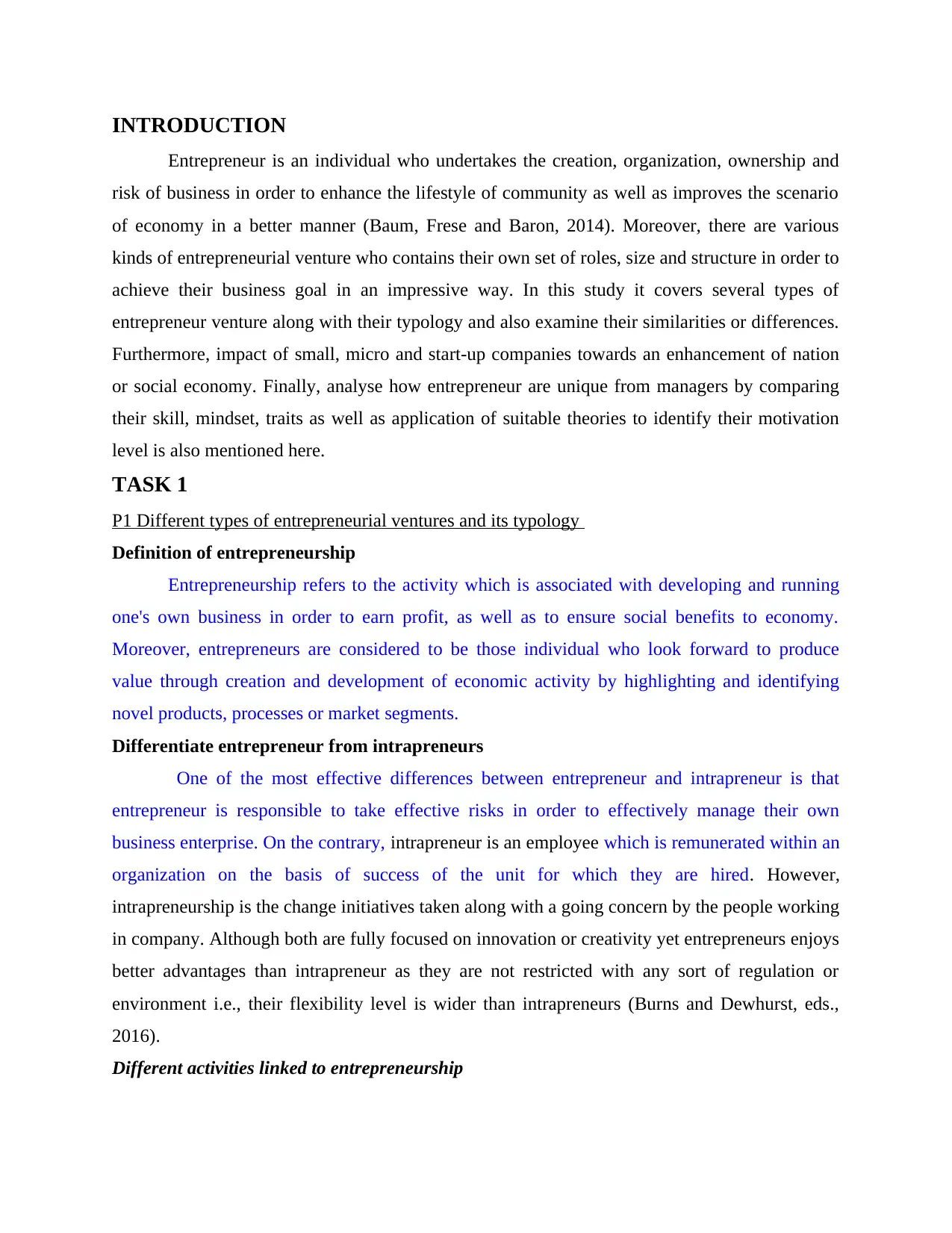
INTRODUCTION
Entrepreneur is an individual who undertakes the creation, organization, ownership and
risk of business in order to enhance the lifestyle of community as well as improves the scenario
of economy in a better manner (Baum, Frese and Baron, 2014). Moreover, there are various
kinds of entrepreneurial venture who contains their own set of roles, size and structure in order to
achieve their business goal in an impressive way. In this study it covers several types of
entrepreneur venture along with their typology and also examine their similarities or differences.
Furthermore, impact of small, micro and start-up companies towards an enhancement of nation
or social economy. Finally, analyse how entrepreneur are unique from managers by comparing
their skill, mindset, traits as well as application of suitable theories to identify their motivation
level is also mentioned here.
TASK 1
P1 Different types of entrepreneurial ventures and its typology
Definition of entrepreneurship
Entrepreneurship refers to the activity which is associated with developing and running
one's own business in order to earn profit, as well as to ensure social benefits to economy.
Moreover, entrepreneurs are considered to be those individual who look forward to produce
value through creation and development of economic activity by highlighting and identifying
novel products, processes or market segments.
Differentiate entrepreneur from intrapreneurs
One of the most effective differences between entrepreneur and intrapreneur is that
entrepreneur is responsible to take effective risks in order to effectively manage their own
business enterprise. On the contrary, intrapreneur is an employee which is remunerated within an
organization on the basis of success of the unit for which they are hired. However,
intrapreneurship is the change initiatives taken along with a going concern by the people working
in company. Although both are fully focused on innovation or creativity yet entrepreneurs enjoys
better advantages than intrapreneur as they are not restricted with any sort of regulation or
environment i.e., their flexibility level is wider than intrapreneurs (Burns and Dewhurst, eds.,
2016).
Different activities linked to entrepreneurship
Entrepreneur is an individual who undertakes the creation, organization, ownership and
risk of business in order to enhance the lifestyle of community as well as improves the scenario
of economy in a better manner (Baum, Frese and Baron, 2014). Moreover, there are various
kinds of entrepreneurial venture who contains their own set of roles, size and structure in order to
achieve their business goal in an impressive way. In this study it covers several types of
entrepreneur venture along with their typology and also examine their similarities or differences.
Furthermore, impact of small, micro and start-up companies towards an enhancement of nation
or social economy. Finally, analyse how entrepreneur are unique from managers by comparing
their skill, mindset, traits as well as application of suitable theories to identify their motivation
level is also mentioned here.
TASK 1
P1 Different types of entrepreneurial ventures and its typology
Definition of entrepreneurship
Entrepreneurship refers to the activity which is associated with developing and running
one's own business in order to earn profit, as well as to ensure social benefits to economy.
Moreover, entrepreneurs are considered to be those individual who look forward to produce
value through creation and development of economic activity by highlighting and identifying
novel products, processes or market segments.
Differentiate entrepreneur from intrapreneurs
One of the most effective differences between entrepreneur and intrapreneur is that
entrepreneur is responsible to take effective risks in order to effectively manage their own
business enterprise. On the contrary, intrapreneur is an employee which is remunerated within an
organization on the basis of success of the unit for which they are hired. However,
intrapreneurship is the change initiatives taken along with a going concern by the people working
in company. Although both are fully focused on innovation or creativity yet entrepreneurs enjoys
better advantages than intrapreneur as they are not restricted with any sort of regulation or
environment i.e., their flexibility level is wider than intrapreneurs (Burns and Dewhurst, eds.,
2016).
Different activities linked to entrepreneurship
⊘ This is a preview!⊘
Do you want full access?
Subscribe today to unlock all pages.

Trusted by 1+ million students worldwide
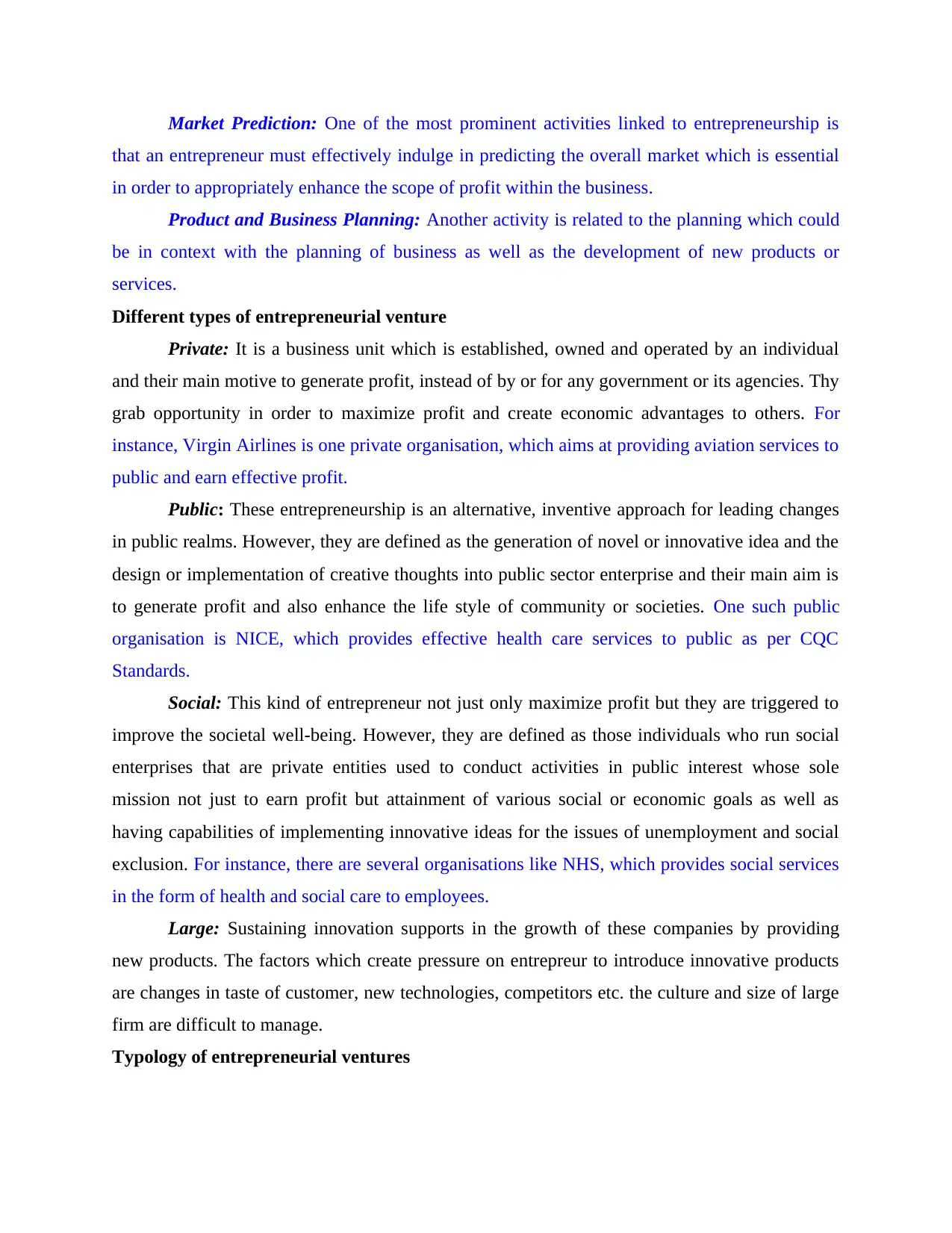
Market Prediction: One of the most prominent activities linked to entrepreneurship is
that an entrepreneur must effectively indulge in predicting the overall market which is essential
in order to appropriately enhance the scope of profit within the business.
Product and Business Planning: Another activity is related to the planning which could
be in context with the planning of business as well as the development of new products or
services.
Different types of entrepreneurial venture
Private: It is a business unit which is established, owned and operated by an individual
and their main motive to generate profit, instead of by or for any government or its agencies. Thy
grab opportunity in order to maximize profit and create economic advantages to others. For
instance, Virgin Airlines is one private organisation, which aims at providing aviation services to
public and earn effective profit.
Public: These entrepreneurship is an alternative, inventive approach for leading changes
in public realms. However, they are defined as the generation of novel or innovative idea and the
design or implementation of creative thoughts into public sector enterprise and their main aim is
to generate profit and also enhance the life style of community or societies. One such public
organisation is NICE, which provides effective health care services to public as per CQC
Standards.
Social: This kind of entrepreneur not just only maximize profit but they are triggered to
improve the societal well-being. However, they are defined as those individuals who run social
enterprises that are private entities used to conduct activities in public interest whose sole
mission not just to earn profit but attainment of various social or economic goals as well as
having capabilities of implementing innovative ideas for the issues of unemployment and social
exclusion. For instance, there are several organisations like NHS, which provides social services
in the form of health and social care to employees.
Large: Sustaining innovation supports in the growth of these companies by providing
new products. The factors which create pressure on entrepreur to introduce innovative products
are changes in taste of customer, new technologies, competitors etc. the culture and size of large
firm are difficult to manage.
Typology of entrepreneurial ventures
that an entrepreneur must effectively indulge in predicting the overall market which is essential
in order to appropriately enhance the scope of profit within the business.
Product and Business Planning: Another activity is related to the planning which could
be in context with the planning of business as well as the development of new products or
services.
Different types of entrepreneurial venture
Private: It is a business unit which is established, owned and operated by an individual
and their main motive to generate profit, instead of by or for any government or its agencies. Thy
grab opportunity in order to maximize profit and create economic advantages to others. For
instance, Virgin Airlines is one private organisation, which aims at providing aviation services to
public and earn effective profit.
Public: These entrepreneurship is an alternative, inventive approach for leading changes
in public realms. However, they are defined as the generation of novel or innovative idea and the
design or implementation of creative thoughts into public sector enterprise and their main aim is
to generate profit and also enhance the life style of community or societies. One such public
organisation is NICE, which provides effective health care services to public as per CQC
Standards.
Social: This kind of entrepreneur not just only maximize profit but they are triggered to
improve the societal well-being. However, they are defined as those individuals who run social
enterprises that are private entities used to conduct activities in public interest whose sole
mission not just to earn profit but attainment of various social or economic goals as well as
having capabilities of implementing innovative ideas for the issues of unemployment and social
exclusion. For instance, there are several organisations like NHS, which provides social services
in the form of health and social care to employees.
Large: Sustaining innovation supports in the growth of these companies by providing
new products. The factors which create pressure on entrepreur to introduce innovative products
are changes in taste of customer, new technologies, competitors etc. the culture and size of large
firm are difficult to manage.
Typology of entrepreneurial ventures
Paraphrase This Document
Need a fresh take? Get an instant paraphrase of this document with our AI Paraphraser
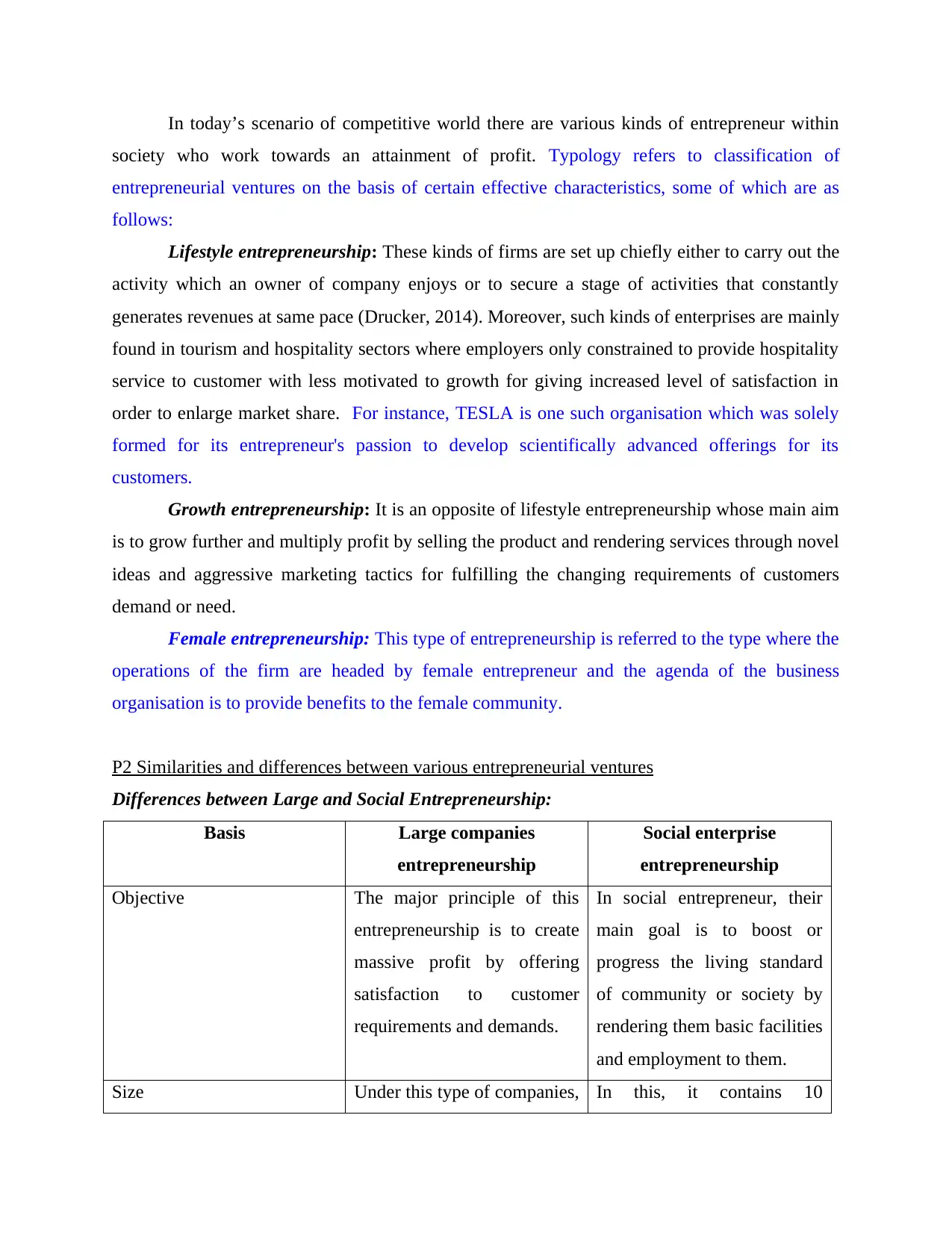
In today’s scenario of competitive world there are various kinds of entrepreneur within
society who work towards an attainment of profit. Typology refers to classification of
entrepreneurial ventures on the basis of certain effective characteristics, some of which are as
follows:
Lifestyle entrepreneurship: These kinds of firms are set up chiefly either to carry out the
activity which an owner of company enjoys or to secure a stage of activities that constantly
generates revenues at same pace (Drucker, 2014). Moreover, such kinds of enterprises are mainly
found in tourism and hospitality sectors where employers only constrained to provide hospitality
service to customer with less motivated to growth for giving increased level of satisfaction in
order to enlarge market share. For instance, TESLA is one such organisation which was solely
formed for its entrepreneur's passion to develop scientifically advanced offerings for its
customers.
Growth entrepreneurship: It is an opposite of lifestyle entrepreneurship whose main aim
is to grow further and multiply profit by selling the product and rendering services through novel
ideas and aggressive marketing tactics for fulfilling the changing requirements of customers
demand or need.
Female entrepreneurship: This type of entrepreneurship is referred to the type where the
operations of the firm are headed by female entrepreneur and the agenda of the business
organisation is to provide benefits to the female community.
P2 Similarities and differences between various entrepreneurial ventures
Differences between Large and Social Entrepreneurship:
Basis Large companies
entrepreneurship
Social enterprise
entrepreneurship
Objective The major principle of this
entrepreneurship is to create
massive profit by offering
satisfaction to customer
requirements and demands.
In social entrepreneur, their
main goal is to boost or
progress the living standard
of community or society by
rendering them basic facilities
and employment to them.
Size Under this type of companies, In this, it contains 10
society who work towards an attainment of profit. Typology refers to classification of
entrepreneurial ventures on the basis of certain effective characteristics, some of which are as
follows:
Lifestyle entrepreneurship: These kinds of firms are set up chiefly either to carry out the
activity which an owner of company enjoys or to secure a stage of activities that constantly
generates revenues at same pace (Drucker, 2014). Moreover, such kinds of enterprises are mainly
found in tourism and hospitality sectors where employers only constrained to provide hospitality
service to customer with less motivated to growth for giving increased level of satisfaction in
order to enlarge market share. For instance, TESLA is one such organisation which was solely
formed for its entrepreneur's passion to develop scientifically advanced offerings for its
customers.
Growth entrepreneurship: It is an opposite of lifestyle entrepreneurship whose main aim
is to grow further and multiply profit by selling the product and rendering services through novel
ideas and aggressive marketing tactics for fulfilling the changing requirements of customers
demand or need.
Female entrepreneurship: This type of entrepreneurship is referred to the type where the
operations of the firm are headed by female entrepreneur and the agenda of the business
organisation is to provide benefits to the female community.
P2 Similarities and differences between various entrepreneurial ventures
Differences between Large and Social Entrepreneurship:
Basis Large companies
entrepreneurship
Social enterprise
entrepreneurship
Objective The major principle of this
entrepreneurship is to create
massive profit by offering
satisfaction to customer
requirements and demands.
In social entrepreneur, their
main goal is to boost or
progress the living standard
of community or society by
rendering them basic facilities
and employment to them.
Size Under this type of companies, In this, it contains 10
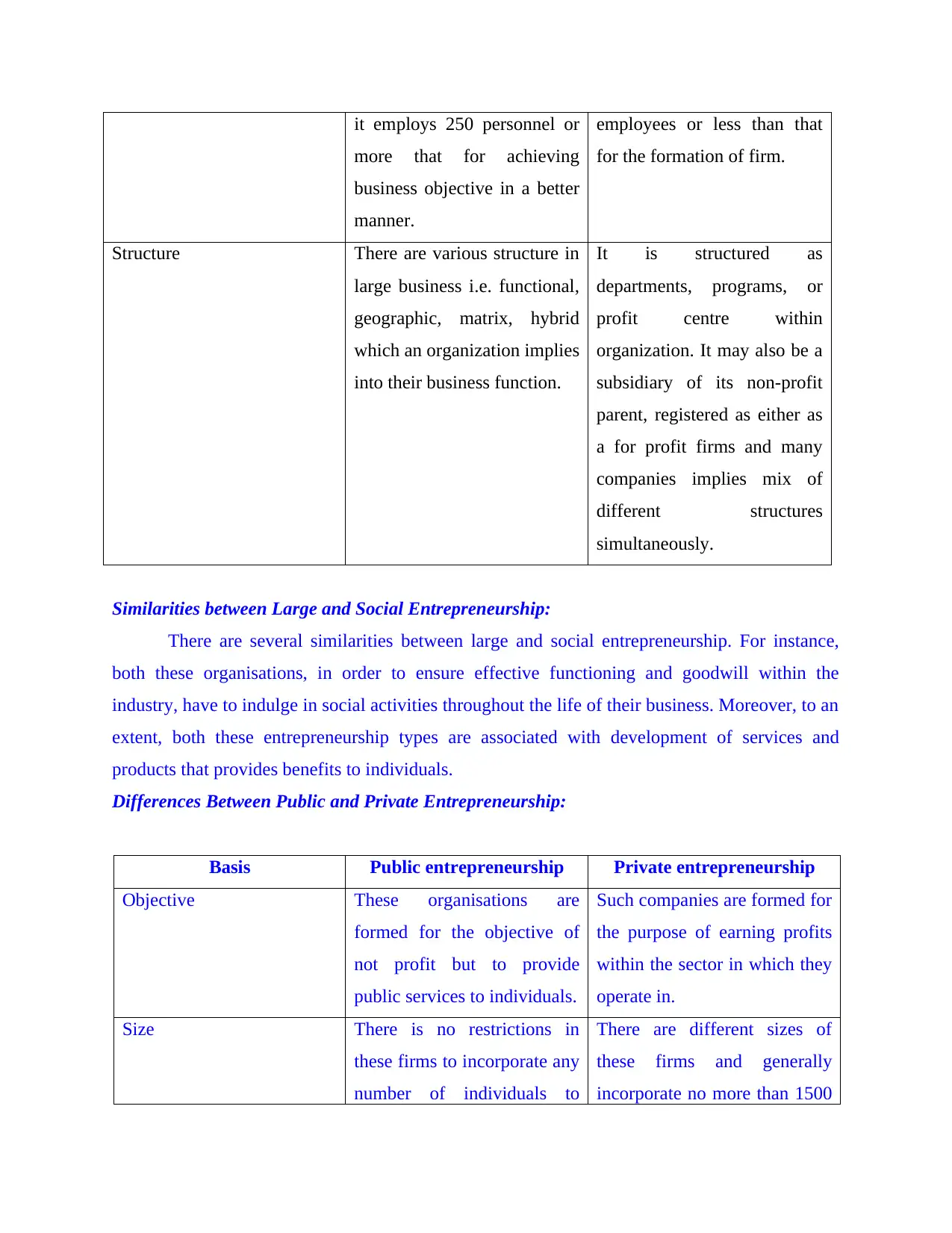
it employs 250 personnel or
more that for achieving
business objective in a better
manner.
employees or less than that
for the formation of firm.
Structure There are various structure in
large business i.e. functional,
geographic, matrix, hybrid
which an organization implies
into their business function.
It is structured as
departments, programs, or
profit centre within
organization. It may also be a
subsidiary of its non-profit
parent, registered as either as
a for profit firms and many
companies implies mix of
different structures
simultaneously.
Similarities between Large and Social Entrepreneurship:
There are several similarities between large and social entrepreneurship. For instance,
both these organisations, in order to ensure effective functioning and goodwill within the
industry, have to indulge in social activities throughout the life of their business. Moreover, to an
extent, both these entrepreneurship types are associated with development of services and
products that provides benefits to individuals.
Differences Between Public and Private Entrepreneurship:
Basis Public entrepreneurship Private entrepreneurship
Objective These organisations are
formed for the objective of
not profit but to provide
public services to individuals.
Such companies are formed for
the purpose of earning profits
within the sector in which they
operate in.
Size There is no restrictions in
these firms to incorporate any
number of individuals to
There are different sizes of
these firms and generally
incorporate no more than 1500
more that for achieving
business objective in a better
manner.
employees or less than that
for the formation of firm.
Structure There are various structure in
large business i.e. functional,
geographic, matrix, hybrid
which an organization implies
into their business function.
It is structured as
departments, programs, or
profit centre within
organization. It may also be a
subsidiary of its non-profit
parent, registered as either as
a for profit firms and many
companies implies mix of
different structures
simultaneously.
Similarities between Large and Social Entrepreneurship:
There are several similarities between large and social entrepreneurship. For instance,
both these organisations, in order to ensure effective functioning and goodwill within the
industry, have to indulge in social activities throughout the life of their business. Moreover, to an
extent, both these entrepreneurship types are associated with development of services and
products that provides benefits to individuals.
Differences Between Public and Private Entrepreneurship:
Basis Public entrepreneurship Private entrepreneurship
Objective These organisations are
formed for the objective of
not profit but to provide
public services to individuals.
Such companies are formed for
the purpose of earning profits
within the sector in which they
operate in.
Size There is no restrictions in
these firms to incorporate any
number of individuals to
There are different sizes of
these firms and generally
incorporate no more than 1500
⊘ This is a preview!⊘
Do you want full access?
Subscribe today to unlock all pages.

Trusted by 1+ million students worldwide
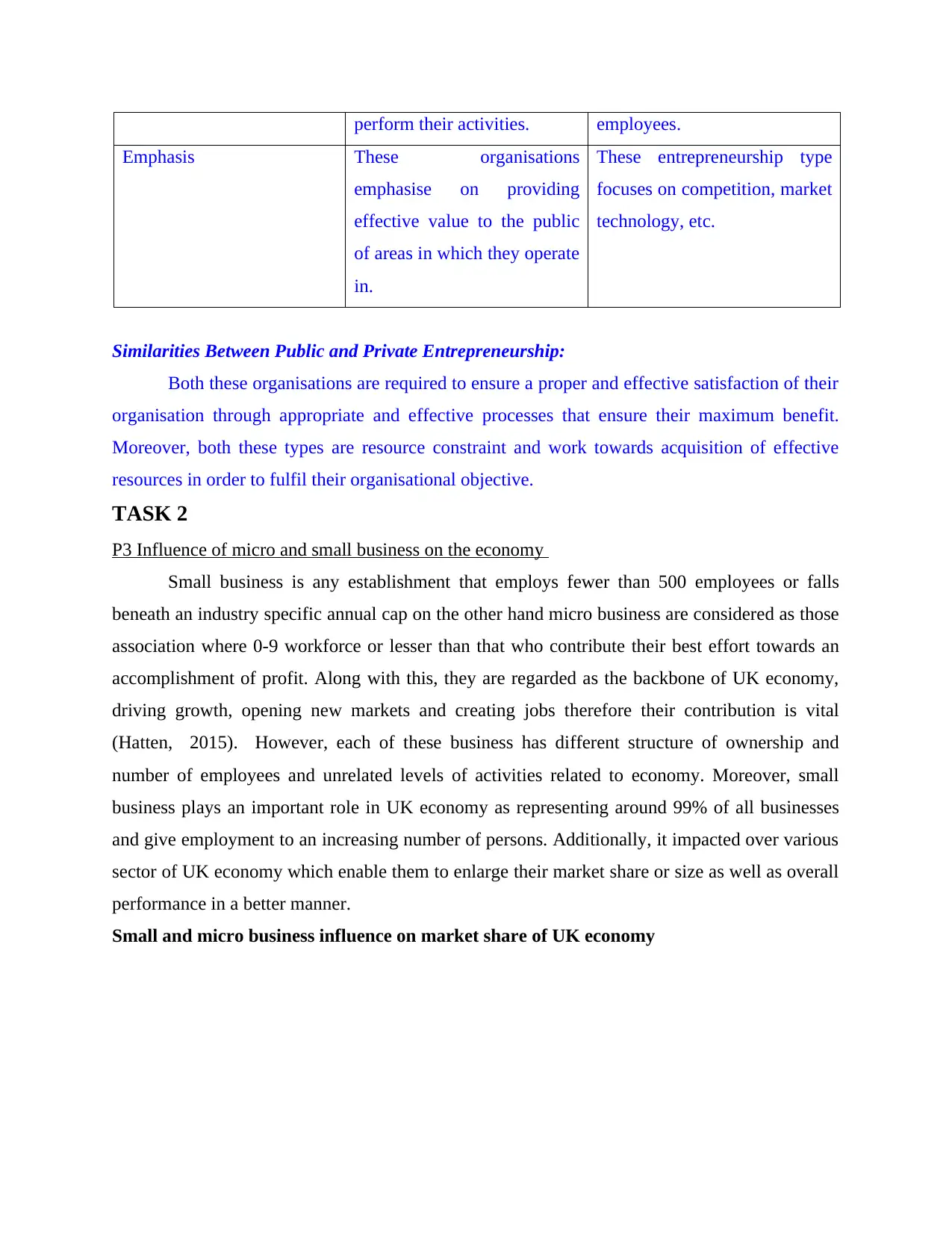
perform their activities. employees.
Emphasis These organisations
emphasise on providing
effective value to the public
of areas in which they operate
in.
These entrepreneurship type
focuses on competition, market
technology, etc.
Similarities Between Public and Private Entrepreneurship:
Both these organisations are required to ensure a proper and effective satisfaction of their
organisation through appropriate and effective processes that ensure their maximum benefit.
Moreover, both these types are resource constraint and work towards acquisition of effective
resources in order to fulfil their organisational objective.
TASK 2
P3 Influence of micro and small business on the economy
Small business is any establishment that employs fewer than 500 employees or falls
beneath an industry specific annual cap on the other hand micro business are considered as those
association where 0-9 workforce or lesser than that who contribute their best effort towards an
accomplishment of profit. Along with this, they are regarded as the backbone of UK economy,
driving growth, opening new markets and creating jobs therefore their contribution is vital
(Hatten, 2015). However, each of these business has different structure of ownership and
number of employees and unrelated levels of activities related to economy. Moreover, small
business plays an important role in UK economy as representing around 99% of all businesses
and give employment to an increasing number of persons. Additionally, it impacted over various
sector of UK economy which enable them to enlarge their market share or size as well as overall
performance in a better manner.
Small and micro business influence on market share of UK economy
Emphasis These organisations
emphasise on providing
effective value to the public
of areas in which they operate
in.
These entrepreneurship type
focuses on competition, market
technology, etc.
Similarities Between Public and Private Entrepreneurship:
Both these organisations are required to ensure a proper and effective satisfaction of their
organisation through appropriate and effective processes that ensure their maximum benefit.
Moreover, both these types are resource constraint and work towards acquisition of effective
resources in order to fulfil their organisational objective.
TASK 2
P3 Influence of micro and small business on the economy
Small business is any establishment that employs fewer than 500 employees or falls
beneath an industry specific annual cap on the other hand micro business are considered as those
association where 0-9 workforce or lesser than that who contribute their best effort towards an
accomplishment of profit. Along with this, they are regarded as the backbone of UK economy,
driving growth, opening new markets and creating jobs therefore their contribution is vital
(Hatten, 2015). However, each of these business has different structure of ownership and
number of employees and unrelated levels of activities related to economy. Moreover, small
business plays an important role in UK economy as representing around 99% of all businesses
and give employment to an increasing number of persons. Additionally, it impacted over various
sector of UK economy which enable them to enlarge their market share or size as well as overall
performance in a better manner.
Small and micro business influence on market share of UK economy
Paraphrase This Document
Need a fresh take? Get an instant paraphrase of this document with our AI Paraphraser
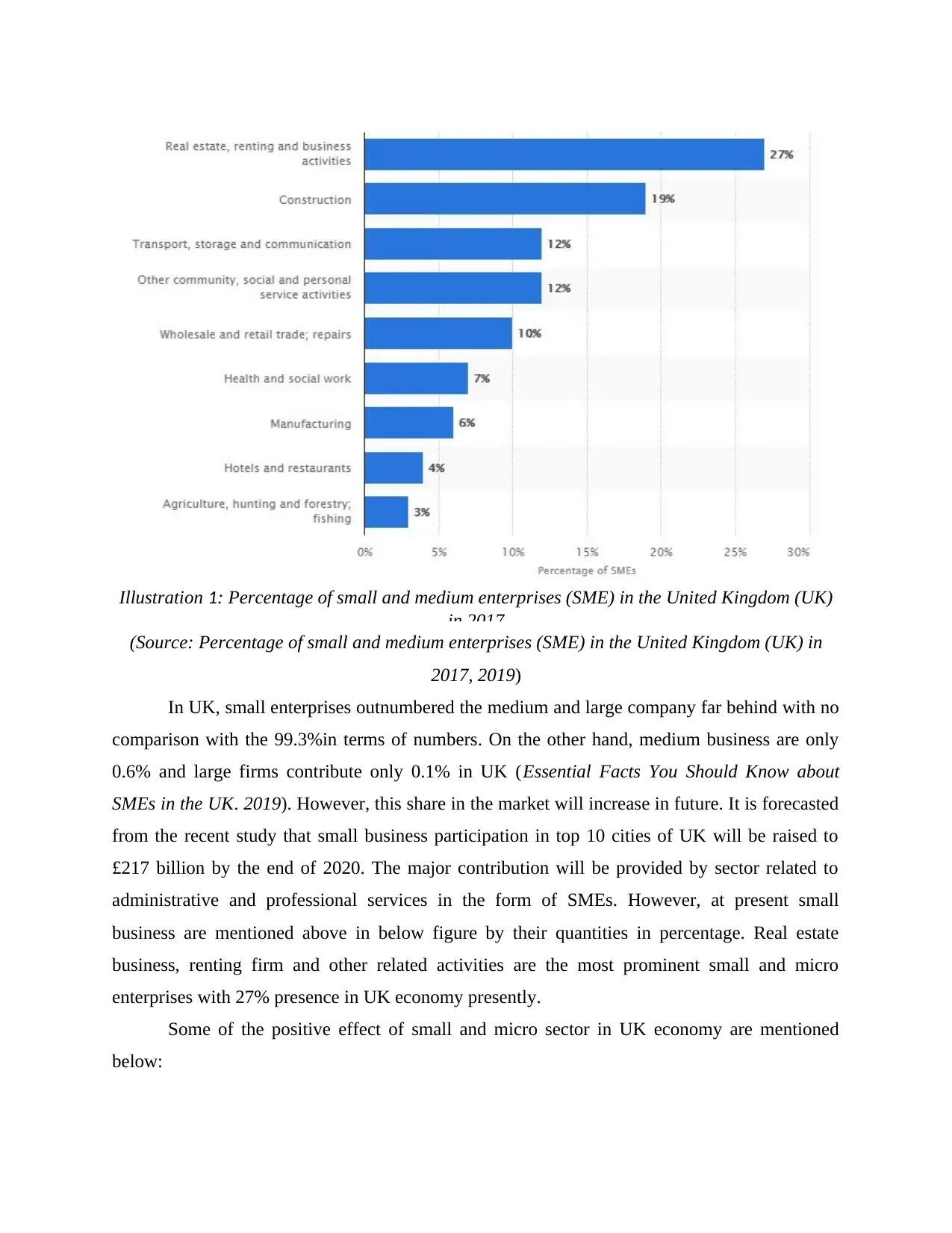
Illustration 1: Percentage of small and medium enterprises (SME) in the United Kingdom (UK)
in 2017
(Source: Percentage of small and medium enterprises (SME) in the United Kingdom (UK) in
2017, 2019)
In UK, small enterprises outnumbered the medium and large company far behind with no
comparison with the 99.3%in terms of numbers. On the other hand, medium business are only
0.6% and large firms contribute only 0.1% in UK (Essential Facts You Should Know about
SMEs in the UK. 2019). However, this share in the market will increase in future. It is forecasted
from the recent study that small business participation in top 10 cities of UK will be raised to
£217 billion by the end of 2020. The major contribution will be provided by sector related to
administrative and professional services in the form of SMEs. However, at present small
business are mentioned above in below figure by their quantities in percentage. Real estate
business, renting firm and other related activities are the most prominent small and micro
enterprises with 27% presence in UK economy presently.
Some of the positive effect of small and micro sector in UK economy are mentioned
below:
in 2017
(Source: Percentage of small and medium enterprises (SME) in the United Kingdom (UK) in
2017, 2019)
In UK, small enterprises outnumbered the medium and large company far behind with no
comparison with the 99.3%in terms of numbers. On the other hand, medium business are only
0.6% and large firms contribute only 0.1% in UK (Essential Facts You Should Know about
SMEs in the UK. 2019). However, this share in the market will increase in future. It is forecasted
from the recent study that small business participation in top 10 cities of UK will be raised to
£217 billion by the end of 2020. The major contribution will be provided by sector related to
administrative and professional services in the form of SMEs. However, at present small
business are mentioned above in below figure by their quantities in percentage. Real estate
business, renting firm and other related activities are the most prominent small and micro
enterprises with 27% presence in UK economy presently.
Some of the positive effect of small and micro sector in UK economy are mentioned
below:
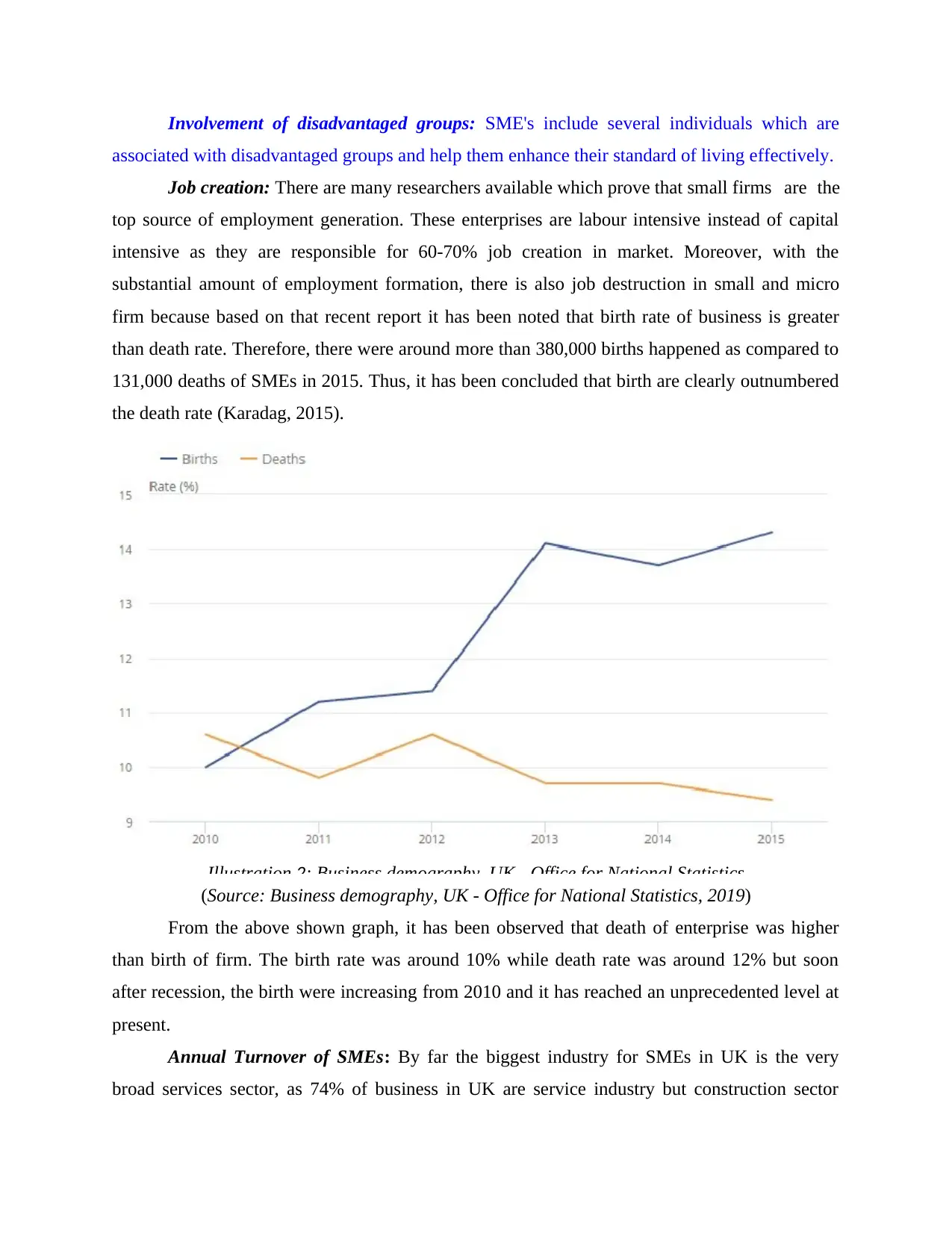
Involvement of disadvantaged groups: SME's include several individuals which are
associated with disadvantaged groups and help them enhance their standard of living effectively.
Job creation: There are many researchers available which prove that small firms are the
top source of employment generation. These enterprises are labour intensive instead of capital
intensive as they are responsible for 60-70% job creation in market. Moreover, with the
substantial amount of employment formation, there is also job destruction in small and micro
firm because based on that recent report it has been noted that birth rate of business is greater
than death rate. Therefore, there were around more than 380,000 births happened as compared to
131,000 deaths of SMEs in 2015. Thus, it has been concluded that birth are clearly outnumbered
the death rate (Karadag, 2015).
Illustration 2: Business demography, UK - Office for National Statistics
(Source: Business demography, UK - Office for National Statistics, 2019)
From the above shown graph, it has been observed that death of enterprise was higher
than birth of firm. The birth rate was around 10% while death rate was around 12% but soon
after recession, the birth were increasing from 2010 and it has reached an unprecedented level at
present.
Annual Turnover of SMEs: By far the biggest industry for SMEs in UK is the very
broad services sector, as 74% of business in UK are service industry but construction sector
associated with disadvantaged groups and help them enhance their standard of living effectively.
Job creation: There are many researchers available which prove that small firms are the
top source of employment generation. These enterprises are labour intensive instead of capital
intensive as they are responsible for 60-70% job creation in market. Moreover, with the
substantial amount of employment formation, there is also job destruction in small and micro
firm because based on that recent report it has been noted that birth rate of business is greater
than death rate. Therefore, there were around more than 380,000 births happened as compared to
131,000 deaths of SMEs in 2015. Thus, it has been concluded that birth are clearly outnumbered
the death rate (Karadag, 2015).
Illustration 2: Business demography, UK - Office for National Statistics
(Source: Business demography, UK - Office for National Statistics, 2019)
From the above shown graph, it has been observed that death of enterprise was higher
than birth of firm. The birth rate was around 10% while death rate was around 12% but soon
after recession, the birth were increasing from 2010 and it has reached an unprecedented level at
present.
Annual Turnover of SMEs: By far the biggest industry for SMEs in UK is the very
broad services sector, as 74% of business in UK are service industry but construction sector
⊘ This is a preview!⊘
Do you want full access?
Subscribe today to unlock all pages.

Trusted by 1+ million students worldwide
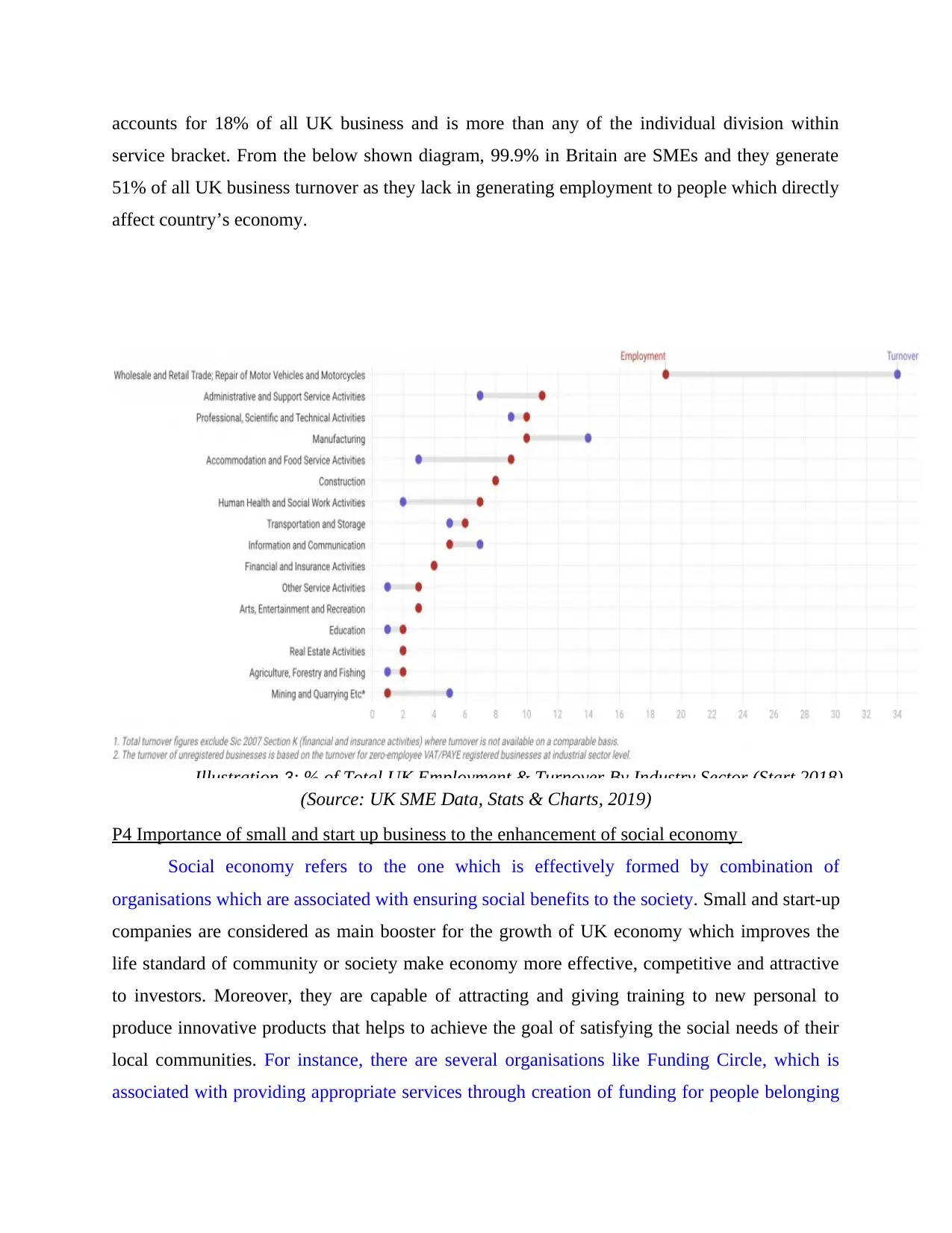
accounts for 18% of all UK business and is more than any of the individual division within
service bracket. From the below shown diagram, 99.9% in Britain are SMEs and they generate
51% of all UK business turnover as they lack in generating employment to people which directly
affect country’s economy.
Illustration 3: % of Total UK Employment & Turnover By Industry Sector (Start 2018)
(Source: UK SME Data, Stats & Charts, 2019)
P4 Importance of small and start up business to the enhancement of social economy
Social economy refers to the one which is effectively formed by combination of
organisations which are associated with ensuring social benefits to the society. Small and start-up
companies are considered as main booster for the growth of UK economy which improves the
life standard of community or society make economy more effective, competitive and attractive
to investors. Moreover, they are capable of attracting and giving training to new personal to
produce innovative products that helps to achieve the goal of satisfying the social needs of their
local communities. For instance, there are several organisations like Funding Circle, which is
associated with providing appropriate services through creation of funding for people belonging
service bracket. From the below shown diagram, 99.9% in Britain are SMEs and they generate
51% of all UK business turnover as they lack in generating employment to people which directly
affect country’s economy.
Illustration 3: % of Total UK Employment & Turnover By Industry Sector (Start 2018)
(Source: UK SME Data, Stats & Charts, 2019)
P4 Importance of small and start up business to the enhancement of social economy
Social economy refers to the one which is effectively formed by combination of
organisations which are associated with ensuring social benefits to the society. Small and start-up
companies are considered as main booster for the growth of UK economy which improves the
life standard of community or society make economy more effective, competitive and attractive
to investors. Moreover, they are capable of attracting and giving training to new personal to
produce innovative products that helps to achieve the goal of satisfying the social needs of their
local communities. For instance, there are several organisations like Funding Circle, which is
associated with providing appropriate services through creation of funding for people belonging
Paraphrase This Document
Need a fresh take? Get an instant paraphrase of this document with our AI Paraphraser
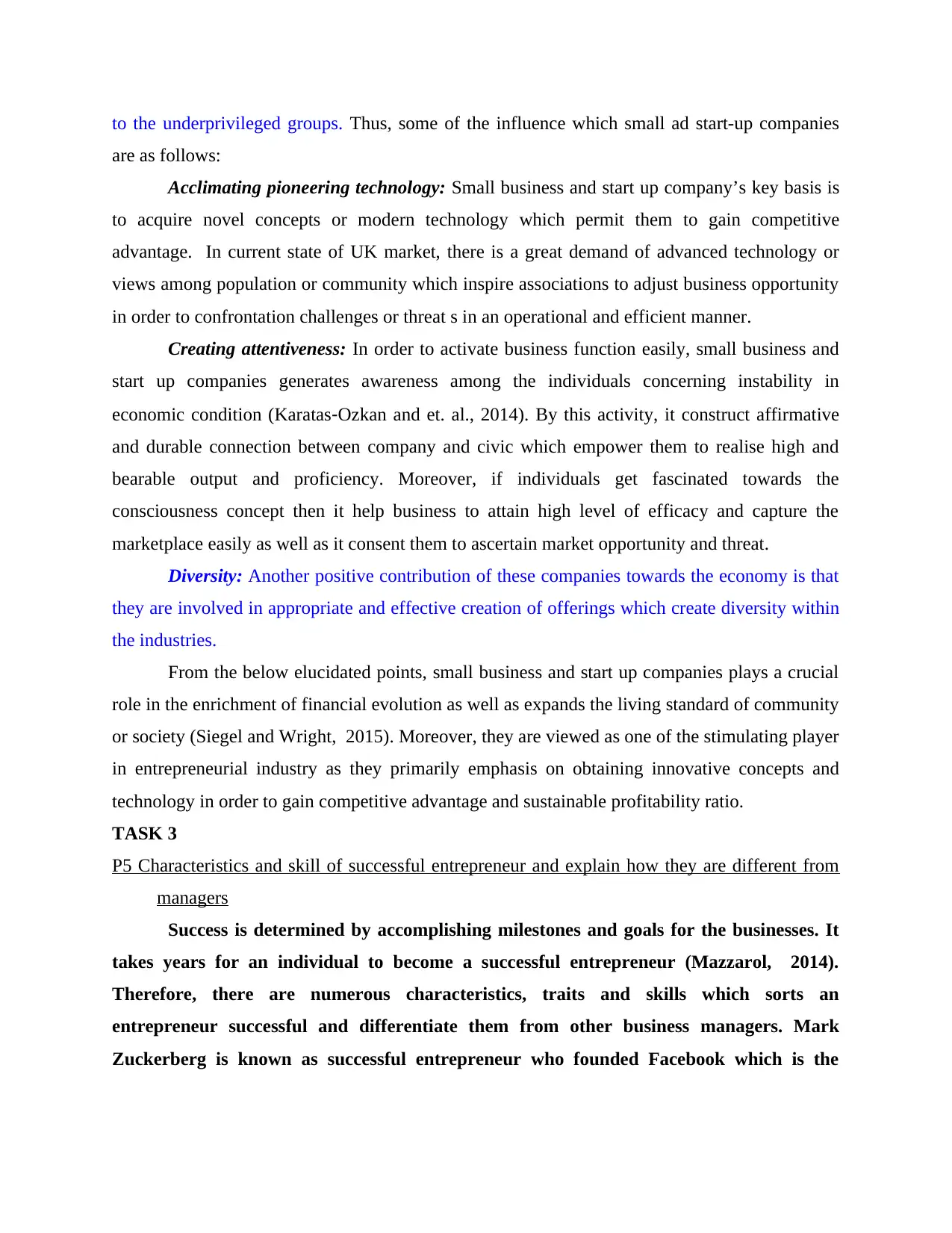
to the underprivileged groups. Thus, some of the influence which small ad start-up companies
are as follows:
Acclimating pioneering technology: Small business and start up company’s key basis is
to acquire novel concepts or modern technology which permit them to gain competitive
advantage. In current state of UK market, there is a great demand of advanced technology or
views among population or community which inspire associations to adjust business opportunity
in order to confrontation challenges or threat s in an operational and efficient manner.
Creating attentiveness: In order to activate business function easily, small business and
start up companies generates awareness among the individuals concerning instability in
economic condition (Karatas‐Ozkan and et. al., 2014). By this activity, it construct affirmative
and durable connection between company and civic which empower them to realise high and
bearable output and proficiency. Moreover, if individuals get fascinated towards the
consciousness concept then it help business to attain high level of efficacy and capture the
marketplace easily as well as it consent them to ascertain market opportunity and threat.
Diversity: Another positive contribution of these companies towards the economy is that
they are involved in appropriate and effective creation of offerings which create diversity within
the industries.
From the below elucidated points, small business and start up companies plays a crucial
role in the enrichment of financial evolution as well as expands the living standard of community
or society (Siegel and Wright, 2015). Moreover, they are viewed as one of the stimulating player
in entrepreneurial industry as they primarily emphasis on obtaining innovative concepts and
technology in order to gain competitive advantage and sustainable profitability ratio.
TASK 3
P5 Characteristics and skill of successful entrepreneur and explain how they are different from
managers
Success is determined by accomplishing milestones and goals for the businesses. It
takes years for an individual to become a successful entrepreneur (Mazzarol, 2014).
Therefore, there are numerous characteristics, traits and skills which sorts an
entrepreneur successful and differentiate them from other business managers. Mark
Zuckerberg is known as successful entrepreneur who founded Facebook which is the
are as follows:
Acclimating pioneering technology: Small business and start up company’s key basis is
to acquire novel concepts or modern technology which permit them to gain competitive
advantage. In current state of UK market, there is a great demand of advanced technology or
views among population or community which inspire associations to adjust business opportunity
in order to confrontation challenges or threat s in an operational and efficient manner.
Creating attentiveness: In order to activate business function easily, small business and
start up companies generates awareness among the individuals concerning instability in
economic condition (Karatas‐Ozkan and et. al., 2014). By this activity, it construct affirmative
and durable connection between company and civic which empower them to realise high and
bearable output and proficiency. Moreover, if individuals get fascinated towards the
consciousness concept then it help business to attain high level of efficacy and capture the
marketplace easily as well as it consent them to ascertain market opportunity and threat.
Diversity: Another positive contribution of these companies towards the economy is that
they are involved in appropriate and effective creation of offerings which create diversity within
the industries.
From the below elucidated points, small business and start up companies plays a crucial
role in the enrichment of financial evolution as well as expands the living standard of community
or society (Siegel and Wright, 2015). Moreover, they are viewed as one of the stimulating player
in entrepreneurial industry as they primarily emphasis on obtaining innovative concepts and
technology in order to gain competitive advantage and sustainable profitability ratio.
TASK 3
P5 Characteristics and skill of successful entrepreneur and explain how they are different from
managers
Success is determined by accomplishing milestones and goals for the businesses. It
takes years for an individual to become a successful entrepreneur (Mazzarol, 2014).
Therefore, there are numerous characteristics, traits and skills which sorts an
entrepreneur successful and differentiate them from other business managers. Mark
Zuckerberg is known as successful entrepreneur who founded Facebook which is the
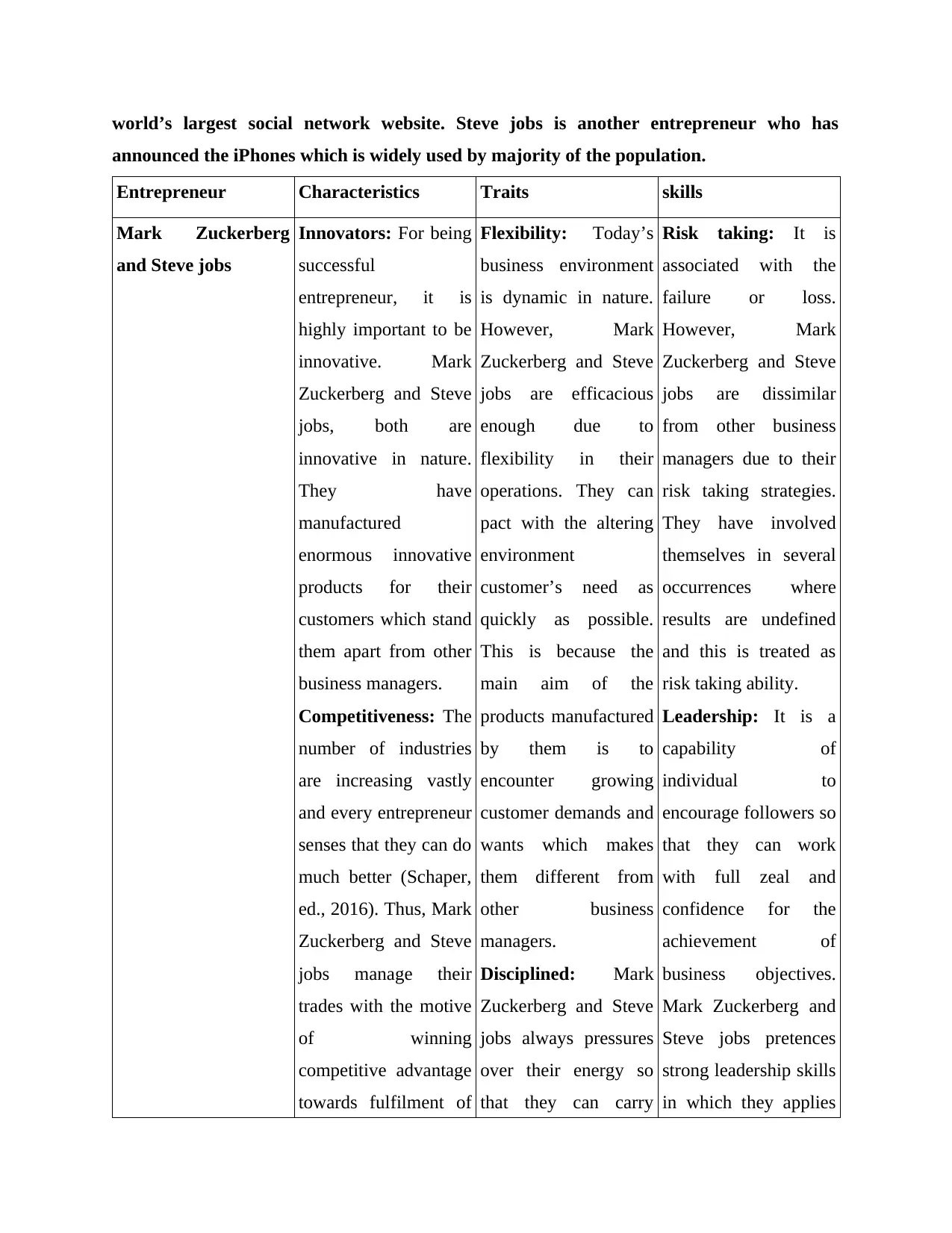
world’s largest social network website. Steve jobs is another entrepreneur who has
announced the iPhones which is widely used by majority of the population.
Entrepreneur Characteristics Traits skills
Mark Zuckerberg
and Steve jobs
Innovators: For being
successful
entrepreneur, it is
highly important to be
innovative. Mark
Zuckerberg and Steve
jobs, both are
innovative in nature.
They have
manufactured
enormous innovative
products for their
customers which stand
them apart from other
business managers.
Competitiveness: The
number of industries
are increasing vastly
and every entrepreneur
senses that they can do
much better (Schaper,
ed., 2016). Thus, Mark
Zuckerberg and Steve
jobs manage their
trades with the motive
of winning
competitive advantage
towards fulfilment of
Flexibility: Today’s
business environment
is dynamic in nature.
However, Mark
Zuckerberg and Steve
jobs are efficacious
enough due to
flexibility in their
operations. They can
pact with the altering
environment
customer’s need as
quickly as possible.
This is because the
main aim of the
products manufactured
by them is to
encounter growing
customer demands and
wants which makes
them different from
other business
managers.
Disciplined: Mark
Zuckerberg and Steve
jobs always pressures
over their energy so
that they can carry
Risk taking: It is
associated with the
failure or loss.
However, Mark
Zuckerberg and Steve
jobs are dissimilar
from other business
managers due to their
risk taking strategies.
They have involved
themselves in several
occurrences where
results are undefined
and this is treated as
risk taking ability.
Leadership: It is a
capability of
individual to
encourage followers so
that they can work
with full zeal and
confidence for the
achievement of
business objectives.
Mark Zuckerberg and
Steve jobs pretences
strong leadership skills
in which they applies
announced the iPhones which is widely used by majority of the population.
Entrepreneur Characteristics Traits skills
Mark Zuckerberg
and Steve jobs
Innovators: For being
successful
entrepreneur, it is
highly important to be
innovative. Mark
Zuckerberg and Steve
jobs, both are
innovative in nature.
They have
manufactured
enormous innovative
products for their
customers which stand
them apart from other
business managers.
Competitiveness: The
number of industries
are increasing vastly
and every entrepreneur
senses that they can do
much better (Schaper,
ed., 2016). Thus, Mark
Zuckerberg and Steve
jobs manage their
trades with the motive
of winning
competitive advantage
towards fulfilment of
Flexibility: Today’s
business environment
is dynamic in nature.
However, Mark
Zuckerberg and Steve
jobs are efficacious
enough due to
flexibility in their
operations. They can
pact with the altering
environment
customer’s need as
quickly as possible.
This is because the
main aim of the
products manufactured
by them is to
encounter growing
customer demands and
wants which makes
them different from
other business
managers.
Disciplined: Mark
Zuckerberg and Steve
jobs always pressures
over their energy so
that they can carry
Risk taking: It is
associated with the
failure or loss.
However, Mark
Zuckerberg and Steve
jobs are dissimilar
from other business
managers due to their
risk taking strategies.
They have involved
themselves in several
occurrences where
results are undefined
and this is treated as
risk taking ability.
Leadership: It is a
capability of
individual to
encourage followers so
that they can work
with full zeal and
confidence for the
achievement of
business objectives.
Mark Zuckerberg and
Steve jobs pretences
strong leadership skills
in which they applies
⊘ This is a preview!⊘
Do you want full access?
Subscribe today to unlock all pages.

Trusted by 1+ million students worldwide
1 out of 18
Related Documents
Your All-in-One AI-Powered Toolkit for Academic Success.
+13062052269
info@desklib.com
Available 24*7 on WhatsApp / Email
![[object Object]](/_next/static/media/star-bottom.7253800d.svg)
Unlock your academic potential
Copyright © 2020–2026 A2Z Services. All Rights Reserved. Developed and managed by ZUCOL.





